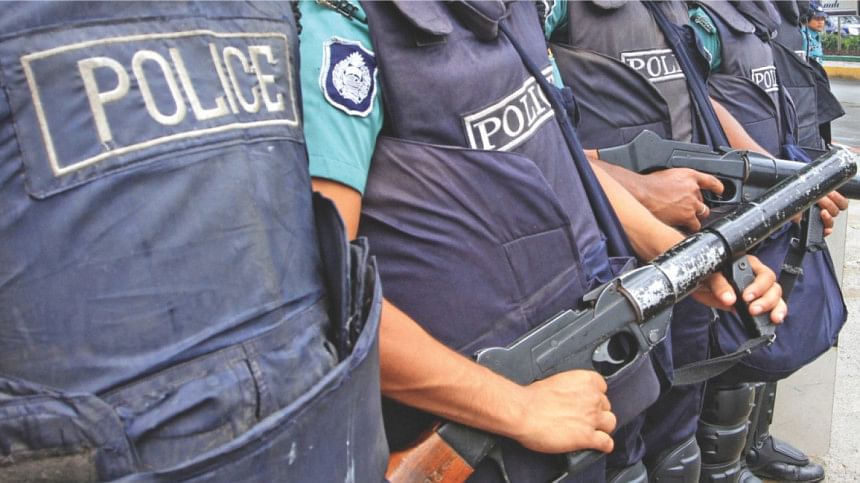Cops sans lethal weapons may be ineffective

The government has decided to remove lethal weapons from the hands of regular police personnel, a move that has sparked concern among former officials and expert who warn that disarming the force without adequate alternatives could undermine its ability to maintain order and respond to armed threats.
Nurul Huda, a former inspector general of police, said that while reducing reliance on deadly firearms is a welcome goal, a blanket disarmament may not be practical.
"If by 'lethal weapons' we mean weapons capable of causing death, then technically all weapons fall under that category," he told The Daily Star yesterday.
"If the police are not equipped with weapons, how are they supposed to exercise the necessary application of force—one of the core components of their lawful authority?"
Nurul Huda noted that effective supervision and control are crucial for responsible use.
"Perhaps the use of lethal weapons by a civil force like the police can be gradually minimised and limited to specific situations.
"But without proper training frameworks, implementing a disarmament policy would face serious practical challenges."
Also speaking to this newspaper yesterday, Nazmul Haque, a former additional inspector general of police, said the decision is unlikely to succeed and warned that, without means of self-defence, it may increase the death rate among officers.
"Such a decision might be suitable for a more civilised society than ours. I believe the decision will need to be revised later."
Home Adviser Lt Gen (retd) Jahangir Alam Chowdhury on Monday announced that police officers would no longer be allowed to carry lethal weapons.
"These weapons must be surrendered. No lethal arms will remain in the hands of the regular police," he said, following the ninth meeting of the Law-and-Order Advisory Committee.
According to the adviser, such weapons would now only be used by the Armed Police Battalion (APBn), which performs duties different from those of the regular force.
The issue of police armament came to the forefront following the deadly crackdown during the July uprising, where security forces -- including armed party activists of the then-ruling Awami League -- were seen firing live ammunition on demonstrators.
Investigations confirmed the use of shotguns, pistols, rifles, and in some areas, even AK-47s and M-16s. The government has so far released a list of 834 martyrs from the uprising, most of whom died from gunshot wounds.
In the wake of the violence, public outcry and expert recommendations -- such as those in the Police Reform Commission's report -- have called for limiting the use of lethal force. The report emphasised that orders to fire on civilians must be considered an extreme last resort.
Even at the Deputy Commissioners' (DC) Conference in February, similar recommendations were made to discourage arming the regular police with deadly firearms.
Commenting on the current policy direction, Inspector General of Police (IGP) Baharul Alam said yesterday that the force must move away from lethal weapons, such as rifles that fire lethal rounds, except in extreme situations.
"We have agreed in principle with the home ministry that we will avoid firearms that discharge bullets that can cause death. We will make a final decision after discussions with all relevant stakeholders," he said at an event at Police Staff College Bangladesh in the capital's Mirpur.
However, the IGP noted that in areas with high insurgency risks, exceptions may apply.
"Under normal circumstances, in law-and-order situations, we will try to ensure there are no lethal weapons involved. Non-lethal methods are actually accepted all over the world."
Sources within the Bangladesh Police say the force currently possesses 7.62mm and 9mm firearms, with 9mm pistols being the most common. Other weapons include 7.62mm Chinese rifles, submachine guns (SMGs), and light machine guns (LMGs), although .303 rifles—once standard—are now virtually obsolete.
Under Section 153 of the Police Regulations of Bangladesh (PRB), police may use firearms only in three circumstances: to protect life and property in self-defence, to disperse unlawful assemblies, and to carry out arrests.
Section 155 further mandates minimal harm and prohibits firing over crowds or at distant targets to prevent harm to innocents. Officers must also cease firing if a crowd begins to disperse.
A committee, led by Khuda Baksh Chowdhury, special assistant to the chief adviser on home affairs, has been formed to examine police use of firearms and guide implementation of the policy change.
Speaking on the matter, Tawohidul Haque, associate professor at Dhaka University's Institute of Social Welfare and Research, told this newspaper, "We may be able to welcome the move if none of the civilians in Bangladesh have weapons in their hands."
"Police have to conduct drives against criminals and the drug network. When criminals had firearms and police did not have any, then the criminals would gain confidence to commit crimes, and police would not be able to perform their duty properly," he warned.
He said that the decisions may lead police to vulnerability.
Tawohidul said, "We need to ensure accountability so that the firearms cannot be harmful to civilians, which needs to be ensured through effective reform."

 For all latest news, follow The Daily Star's Google News channel.
For all latest news, follow The Daily Star's Google News channel. 



Comments